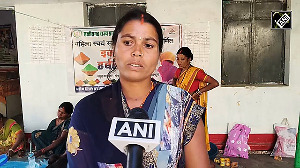Twenty-four-year-old Sonaru Ramkarma stands in an awkward attention position and gives his version of a salute -- a stiff, half cocked swing of his right hand, with the open palm vertically next to his face. He has a .303 rifle slung over his shoulder.
When asked to show us around the camp, Ramkarma's rifle quickly disappears into a nearby makeshift mud hut. So do half a dozen teenagers, who till then were hovering around him. Ramkarma is the leader of the Salwa Judum camp at Kasauli in Chattisgarh's Maoist-hit Geedham district.
The teenagers are all under Ramkarma. They are special police officers and are trained to handle the .303s. Their job is to guard the tribals in the camps, and hunt for Maoists along with the security forces in the nearby jungles.
Salwa Judum in the local Gondi language means 'peace march.' A peace march where teenaged boys and girls strut around with rifles slung over their shoulders. The movement, dubbed by the state as a spontaneous tribal uprising against the Maoists, began in July 2005.
Salwa Judum is alleged to be a ruthless outfit that has forcibly brought villagers to camps and has forced them to live the lives of refugees in their own land.
Villagers, irrespective of age, are recruited for the movement. After three months of training, these SPOs are sent back to man the camps. Each Salwa Judum camp has about 1500-2000 villagers who have left their villages in the jungle for good.
In all, there are 43,000 tribal people living in these camps in Maoist-hit districts. In these camps, a thatched roof over uneven mud walls is home. Most camps have no electricity supply. Four posts with a tin sheet for a roof is the school. Toilets? Why need toilets when the airy jungle expands just at the periphery of the camp.
Salwa Judum camps are mostly by the highways, but there are a few -- like the Kasauli camp -- that are right next to the forests where the Maoists are.
The Kasauli camp has about 1,500 people. The camp is almost deserted. But for a handful of people, modeling clay, weaving and doing some woodwork, there is nobody in the camp. "Chidiya marne gaye honge (must have gone to hunt birds)," is how Ramkarma explains.
Unlike the handful of people who are engaged in the above activities, others in the camp have nothing to do but wile away their time. Like 30-year-old Budru Mangu. Mangu is sitting outside his home, doing nothing.
"It is difficult to find work these days. I have to feed a family of five. I go to Gidham village in search of something to do daily. Some days, I get work. Through the daily wage, I earn around Rs 600 a month," he says. Rs 600 to feed a family of five.
Mangu says he left the village because
"Here, at least, I feel safe," he says. Ask him if he will ever go back to his village and Mangu says, "I will, but only if the problem is solved."
Knowing well about the consequences, why have the villagers chosen these camps over their traditional homes in the forest? Eighty-year-old Mahadev in the Nelasnar camp has the answer.
"These Maoists first came into the forest and said we will do this and that for you. They did some of what they promised also. So the villagers were sympathetic towards them. But over the course of time, they had the village divided. Those who had their support began harassing the rest of the villages. When we could take no more, we came here to the camps," he says.
Youngsters from his village, who are in the same camp, agree. Refusing to give his name, one of them says: "The Maoists at one point of time used us to loot police stations and also attack other areas. One such time, I attacked the local police station along with them. I was threatened with dire consequences. What else could I have done," he asks.
Chilling, because this is exactly what the state is now doing via Salwa Judum.
"They take us to our villages from time to time during an offensive. When we go there, there is nothing left of our houses," the youngster says.
"The security forces push the villagers in front and use them as a human shield in operations. When everything settles down in the forests, there will be hell to pay for. The villagers are not going to keep quiet when they come to know that the state is using them," says an official, on condition of anonymity.
For these villagers, the pain of seeing their belongings razed down is more.
"When we go into our villages along with security forces, we cannot bear to see our houses gutted down. All our domesticated cattle have turned wild. Even if we want to bring them back to the camps to make a living, the cattle don't heed us. They have turned completely wild. I hope I can go back to my village before I die," says Mahadev.
Sixty-year-old Pathlu Pagu has no such illusions. Pagu, who is in a Salwa Judum camp at Belnar, says he will die a middle-of-nowhere death.
"If I go back to my village in the forest, do you think the Maoists are waiting there to welcome me with open arms? They will kill me. Going back there is not possible. Over here at the camps, we have nothing to do. The state will not do anything for us. We will have to rot here till the end of our days.
Or otherwise if the government decides to forcibly send us back to our villagers, we will die at the hands of the Maoists. This is our fate and there is nothing anyone can do about it," he says.






 © 2025
© 2025